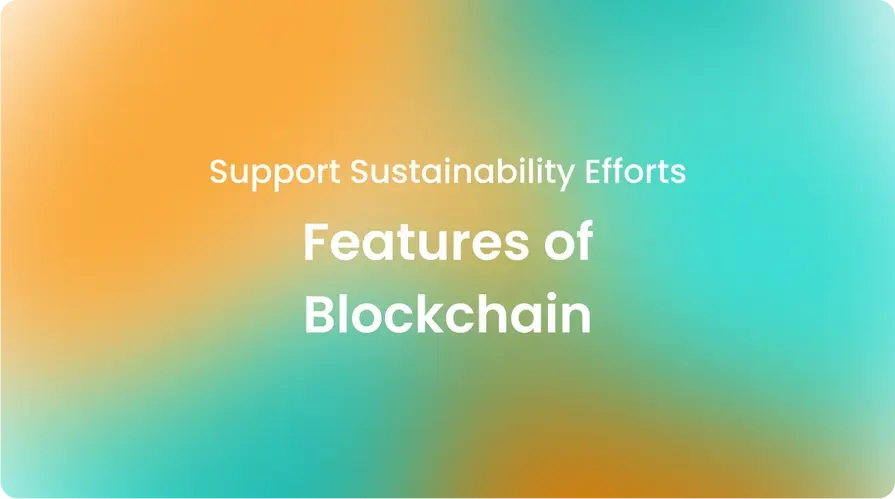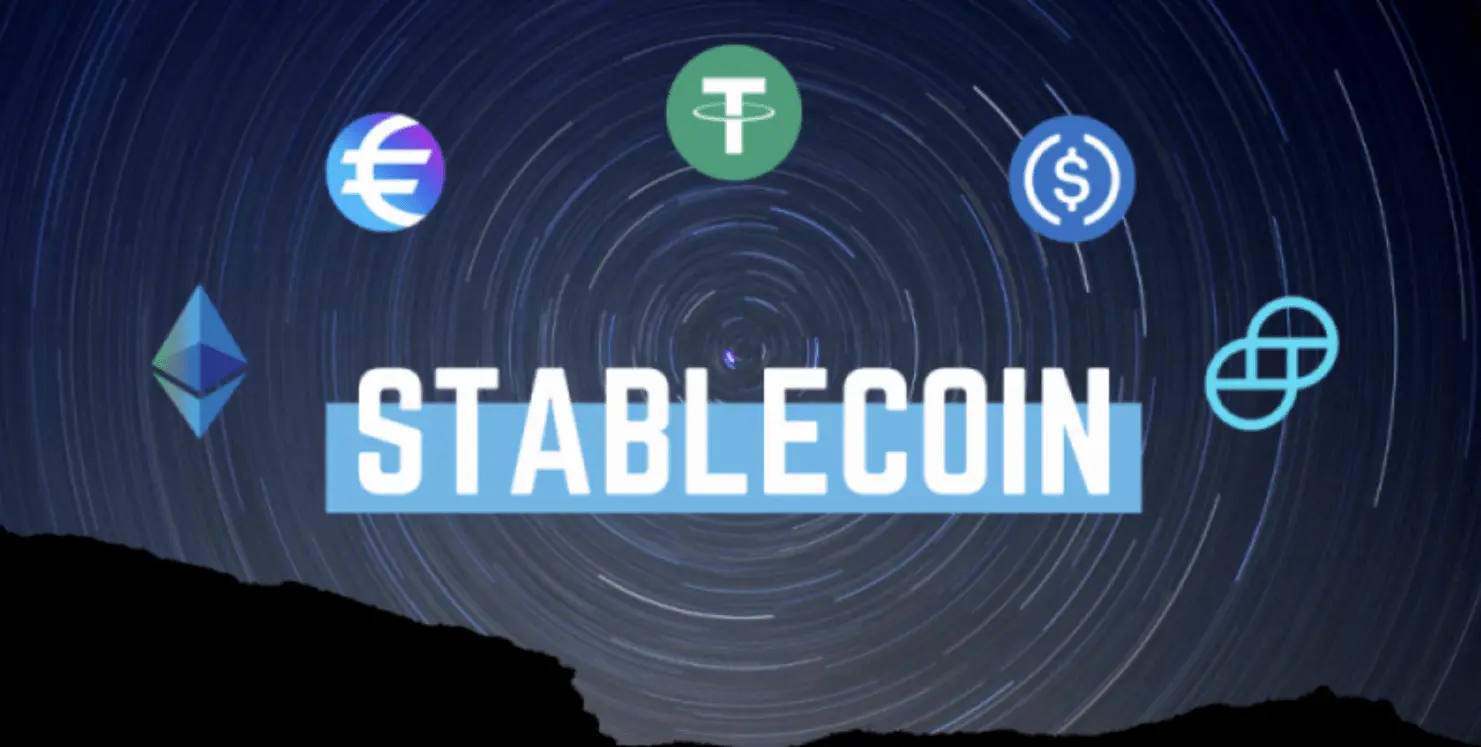TL;DR
The article explores “How Can Features of Blockchain Support Sustainability Efforts.” Blockchain, a distributed digital ledger system, is often used to promote sustainability. Its immutable nature ensures accountability and transparency, which are crucial for sustainable practices.
Blockchain’s features support sustainability efforts in various sectors, including supply chain management and waste management. For instance, it enhances supply chain transparency, supports eco-friendly initiatives, and helps reduce carbon footprint.
Blockchain technology is also used to incentivize recycling and track renewable energy use. Blockchain is a powerful tool that can support sustainability, transforming our approach towards a sustainable future.
Introduction
In the face of growing environmental concerns and the urgent need for sustainable practices, blockchain technology emerges as a potential game-changer. This digital ledger system, often associated with cryptocurrencies, has unique features that can be utilized to support sustainability efforts and foster a sustainable future.
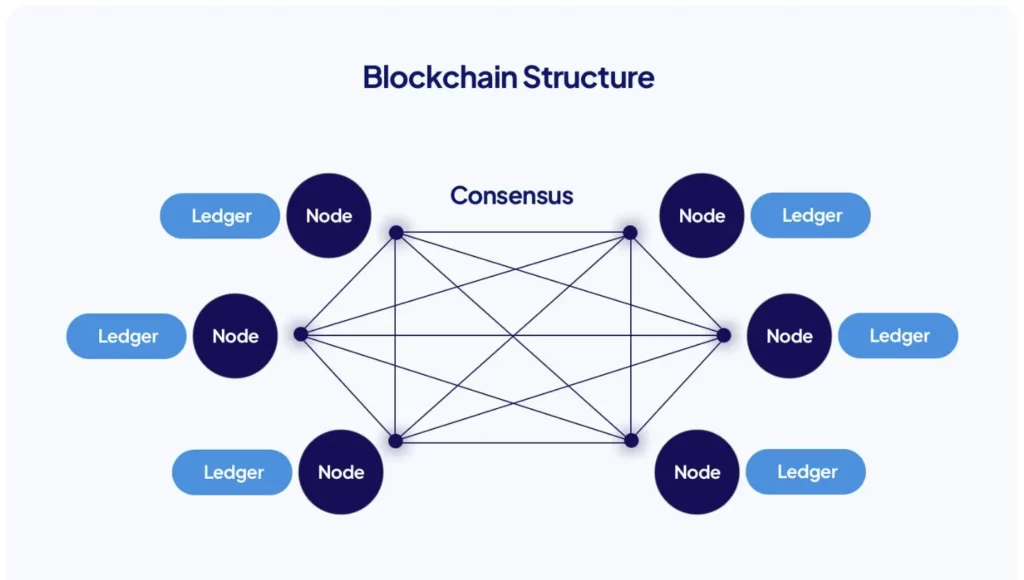
The Role of blockchain technology in sustainability efforts
With its decentralized, transparent, and immutable nature, blockchain technology can play a significant role in sustainability efforts. Blockchain networks can track and verify transactions without intermediaries, ensuring transparency and reducing fraud. This feature can track the carbon emissions of companies and individuals, helping them reduce their carbon footprint.
Blockchain can be used to create tokens representing carbon credits, allowing businesses to trade them and incentivize emission reduction. Blockchain can track the provenance of goods throughout the supply chain, ensuring ethical and sustainable practices. Moreover, the use of blockchain in energy management systems can improve efficiency and promote the use of renewable energy sources.
Blockchain’s potential to help reduce carbon emissions and promote sustainability practices is being recognized by major blockchain companies and sustainability initiatives. For example, the Energy Web Foundation is using blockchain to create a decentralized energy grid, reducing greenhouse gas emissions and promoting renewable energy.
The importance of sustainable development in today’s world
The significance of sustainable development in our modern society cannot be overstated. It’s about fulfilling our current needs without jeopardizing the capacity of future generations to satisfy theirs. It involves preserving the environment, maintaining social and economic equality, and judiciously using available resources to prevent overexploitation.
The increasing impacts of changes in climate and environmental degradation further highlight the importance of sustainable development. Sustainable development goals like reducing poverty, improving health and well-being, and promoting gender equality, are essential for creating a peaceful, fair, and thriving society.
Moreover, sustainable development can also contribute to economic growth by promoting sustainable business practices and eco-friendly products.
In conclusion, the intersection of blockchain technology and sustainability presents a promising path toward a sustainable future. By leveraging the unique features of blockchain, we can promote transparency, efficiency, and accountability in our efforts to achieve sustainable development.
Decoding Blockchain Technology
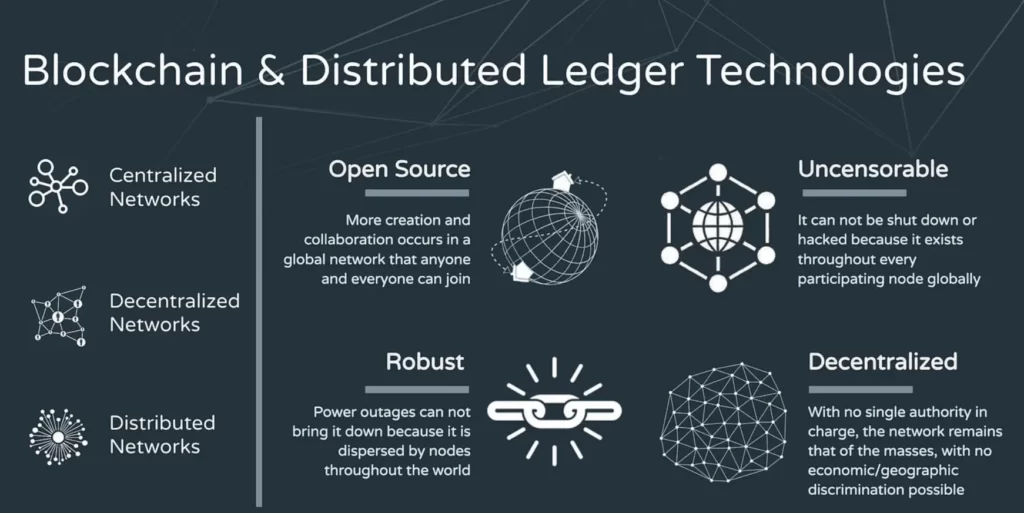
Blockchain technology, often associated with cryptocurrencies, is a revolutionary form of distributed ledger technology (DLT) with far-reaching implications across various industries.
It is a system that maintains transparent, secure, and immutable records of data transactions across a decentralized network, putting an end to the need for intermediaries and fostering trust and efficiency.
Understanding the features of blockchain
Blockchain is a shared, fixed ledger that records transactions, tracks assets, and builds trust. It is a system where transaction data is stored in blocks, and are linked chronologically, forming a chain. Each block contains a timestamp, clarifying when the data was recorded and stored.
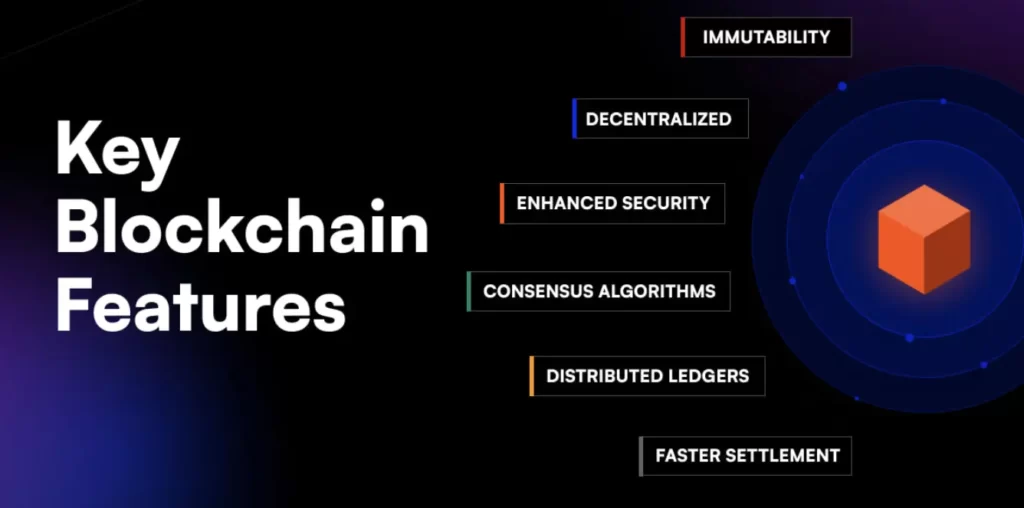
This is crucial for transaction or supply chain data, where the exact timing of a process is essential. Blockchain technology’s applications extend beyond the realm of digital assets. Its unique capability to append and store data allows it to serve various functions across numerous sectors.
The unique attributes of blockchain: Decentralization, Transparency, Traceability, Immutability, Smart Contracts
Blockchain’s unique attributes include decentralization, transparency, traceability, immutability, and the use of smart contracts.
- Decentralization: Blockchain operates on a peer-to-peer network, and every participant or “node” maintains their copy of the blockchain, ensuring no single point of failure.
- Transparency: All transactions are visible to all network participants, fostering trust and collaboration.
- Traceability: Each block is connected to the ones before and after, providing a clear trace of transactions.
- Immutability: Once a transaction is logged on the blockchain, it’s unchangeable and permanent.
- Smart Contracts: These are automated contracts with the agreement’s conditions embedded directly into the code, streamlining transactions and minimizing the need for middlemen.
Blockchain technology, with its unique features, is poised to revolutionize various sectors, from finance to healthcare, agriculture, and beyond.
Blockchain’s Role in Sustainability
Blockchain technology, a decentralized digital ledger that securely and transparently documents transactions has surfaced as a potentially viable answer to the challenges of integrating renewable energy sources into existing energy infrastructure.
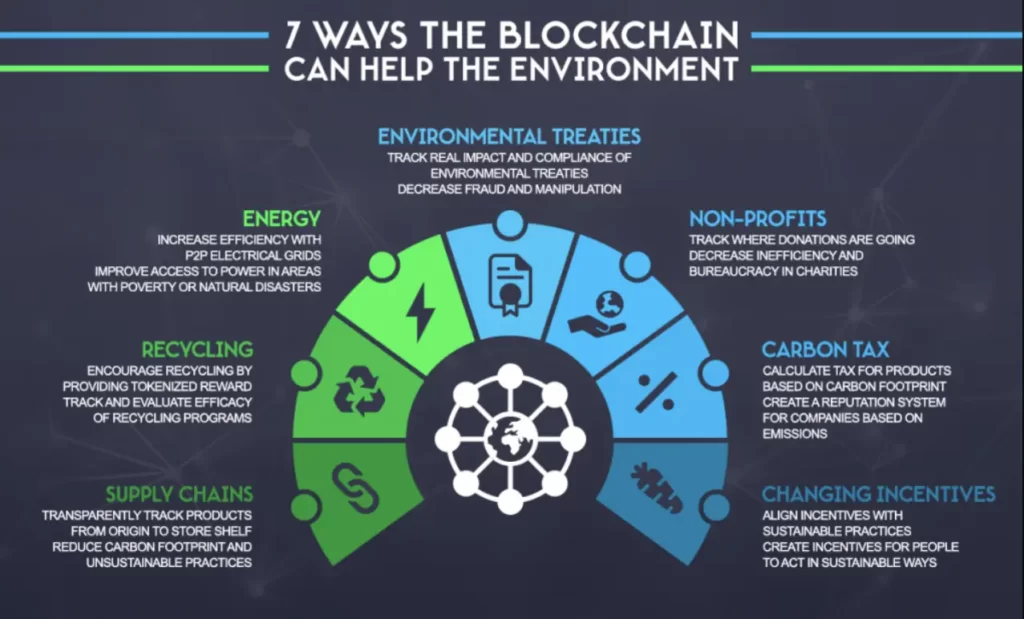
The renewable energy sector faces several challenges, including variable energy supply and demand, difficulties in tracking energy production and usage, and the necessity for reliable and efficient energy storage solutions.
The potential of blockchain supports sustainability efforts.
Blockchain technology can provide a transparent, decentralized platform for tracking, verifying, and managing renewable energy resources. It can create a more transparent and accountable energy system by monitoring and validating renewable energy resources.
This can help to create trust between energy producers and consumers while also ensuring that renewable energy resources are used ethically and sustainably.
How blockchain technology can help promote sustainability
Blockchain technology can improve productivity by developing a more decentralized and automated energy system. This can help to reduce administrative costs and overheads associated with conventional energy systems, making renewable energy more accessible to a wider variety of individuals and businesses.
Additionally, blockchain technology has the potential to work to make the energy system more resilient by decreasing the risk of cyberattacks and other security breaches.
Decentralization and Renewable Energy
Decentralization is one of the key attributes of blockchain technology that can significantly impact the renewable energy sector.
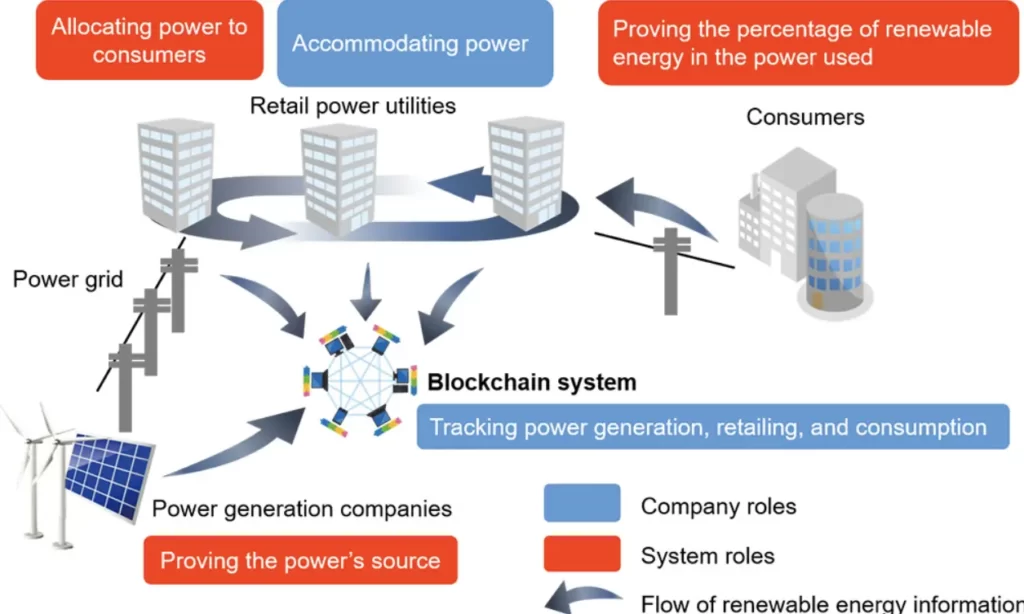
The impact of blockchain’s decentralized feature on renewable energy
Blockchain’s decentralized characteristic can help tackle some of the primary issues encountered by the renewable energy industry.
For example, it is possible to create a peer-to-peer energy trading platform using blockchain technology, where individuals and companies can purchase and sell renewable energy directly to each other. This can contribute to reducing dependence on traditional energy providers and fostering a more decentralized energy system.
A look at how blockchain technology supports decentralized renewable energy systems
For instance, in Germany, the Brooklyn Microgrid project uses blockchain to create a peer-to-peer energy trading platform, allowing homeowners to sell surplus solar energy to their neighbors.
The platform uses blockchain to track each participant’s energy production and consumption, ensuring the energy grid remains stable and balanced. This shows how blockchain technology can support decentralized renewable energy systems by providing a secure and transparent platform for energy transactions.
Transparency, Traceability, and Sustainable Business Practices
Transparency and traceability are two pillars of sustainable business practices. Blockchain, a digital ledger that is distributed across a network of computers, plays a pivotal role in enhancing these aspects.
The Role of blockchain in promoting transparency and traceability in sustainable business practices
Blockchain technology can be used to promote transparency and traceability in sustainable business practices. The features of blockchain that support this include its ability to provide a secure, immutable record of transactions, which can be independently verified by any participant in the network.
This makes blockchain an effective tool for tracking and verifying the sustainability credentials of products and services, from the starting point of raw materials to the point of sale.
This way, blockchain helps companies demonstrate their Loyalty to sustainability and gain the trust of consumers and stakeholders[
An exploration of how blockchain can help companies adopt sustainable practices
Blockchain can also help companies adopt sustainable practices in several ways. For instance, blockchain can be utilized to track energy usage, carbon emissions, and waste production in real-time, providing companies with the data they need to identify areas where improvements can be made.
Moreover, blockchain can be used to support the implementation of circular economy models by tracking the lifecycle of products and materials and facilitating their reuse and recycling.
Immutable Records and Environmental Assessments
Immutable records provided by blockchain technology are crucial in assessing environmental impact and driving sustainability goals.
The importance of blockchain’s immutability feature in assessing the environmental impact
The immutability feature of blockchain, which makes it difficult to change or tamper with recorded data, is particularly important in assessing environmental impact. This ensures the integrity and reliability of environmental data, making it a powerful tool for environmental impact assessments.
For instance, blockchain can track and verify the carbon emissions of companies, providing a trustworthy basis for carbon accounting and reporting.
A case study of how blockchain supports environmental impact assessments
A case study that illustrates how blockchain supports environmental impact assessments involves the use of blockchain technology to track the environmental impact of cryptocurrency mining.
The study found that the energy consumption and environmental impact of mining cryptocurrencies like Bitcoin and Ethereum can be accurately tracked and assessed using blockchain, providing valuable insights into the environmental footprint of these digital currencies.
Smart Contracts and Carbon Offsetting
Smart contracts and carbon offsetting are two areas where blockchain technology can have a huge impact in terms of sustainability.
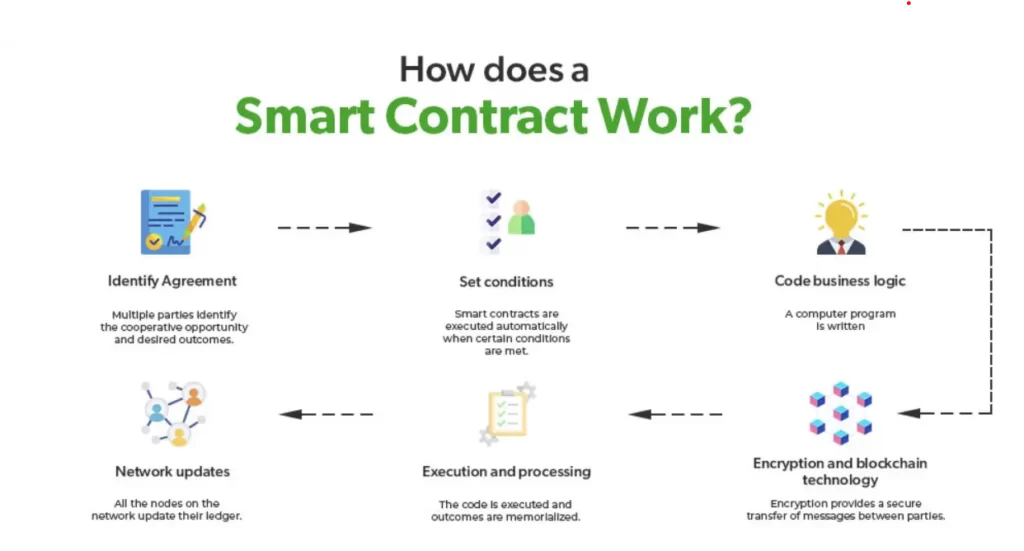
The Role of smart contracts in managing the carbon footprint
Smart contracts, which are automated contracts with the agreement’s terms embedded directly into the code, can play a vital role in managing carbon emissions.
For example, smart contracts can be used to self-operate the process of buying and selling carbon credits, making it easier for companies to balance their carbon emissions. This can help companies to achieve their sustainability goals and reduce their impact on the planet.
A look at how blockchain can help in trading carbon credits
Blockchain features can also help in trading carbon credits by providing a transparent and efficient platform for transactions. For Example, blockchain can create a decentralized market for carbon credits, where buyers and sellers can interact directly without intermediaries.
This can lower transaction costs and improve the efficiency of the carbon market. Moreover, the immutability feature of blockchain ensures that each transaction is recorded and cannot be altered, providing a reliable record of carbon credit transactions.
Blockchain can also support the tokenization of carbon credits, making them easier to trade. Tokenization involves representing a carbon credit as a digital token on the blockchain. These tokens can be purchased, sold, and traded like any other digital asset, providing a flexible and accessible way for companies to offset their carbon emissions.
Distributed Ledger Technology and Eco-friendly Initiatives
Distributed Ledger Technology (DLT), such as blockchain, is a powerful tool that can be used to support eco-friendly initiatives and waste management. By providing a secure, transparent, and immutable record of transactions, DLT can enhance accountability and efficiency in waste management processes.
The impact of Distributed Ledger Technology (DLT) on eco-friendly initiatives
DLT, with its inherent features, supports eco-friendly initiatives by providing a Clear and tamper-proof record of transactions. This transparency can be leveraged to track waste from its origin to its final disposal site, ensuring accountability and compliance with environmental regulations.
For instance, by attaching a digital “tag” to each waste item or batch, its journey can be tracked and recorded on a decentralized and immutable ledger. This ensures that every participant in the waste management chain – from producers to transporters to disposers – is held responsible for their role in the process. Any attempts to alter the records would be instantly noticeable, providing a strong deterrent against fraudulent activities.
A case study of how blockchain supports waste management
One of the successful implementations of blockchain in waste management is by Plastic Bank. This organization has ingeniously employed blockchain technology to meticulously trace plastic waste from the point of collection through the entire recycling process. By tokenizing plastic waste, Plastic Bank encourages and incentivizes individuals and communities to actively participate in waste collection.
In return for their efforts, they are rewarded with digital tokens that can be exchanged for a variety of goods or services. This innovative model transforms plastic waste into a type of currency, offering an economic lifeline to disadvantaged communities, especially in the developing countries where the company operates, such as Haiti, the Philippines, and Indonesia.
Another compelling example is RecycleGO, a company that has successfully leveraged blockchain technology to promote sustainable waste management. RecycleGO incentivizes individuals and businesses to recycle their waste by offering them digital tokens, known as ‘Green Points,’ based on the weight and type of recyclable materials that users dispose of responsibly.
These tokens hold real-world value and can be redeemed for discounts, and services, or donated to environmental causes through the RecycleGO platform.
Blockchain in Sustainable Supply Chain Management
Blockchain, a distributed database, is a digital ledger that is immutable and can be utilized to promote sustainability in supply chain management. It’s a system that can support sustainable business practices by providing transparency and traceability, two key features of blockchain that support sustainability efforts.
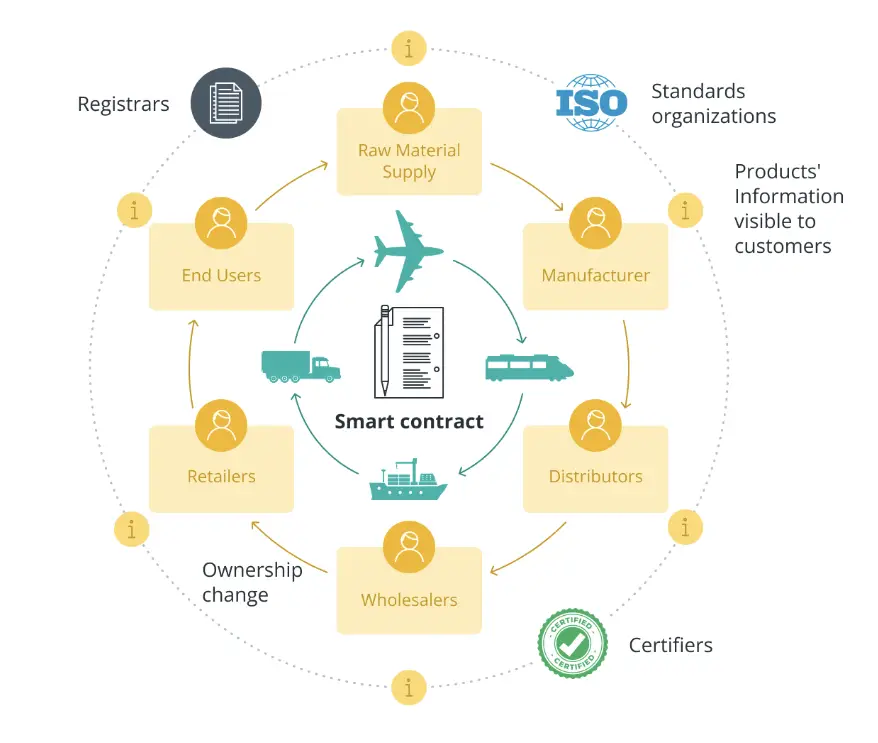
The Role of blockchain in achieving supply chain transparency
Blockchain technology can be used to increase transparency in supply chains. Every transaction recorded on the blockchain is visible to all participants, which makes blockchain a powerful tool for ensuring accountability and trust.
This transparency can help businesses identify inefficiencies or unethical practices in their supply chains, enabling them to make changes that align with their sustainability goals. For instance, a company can use blockchain to track a product from its origin to the consumer, ensuring that every step of the process is sustainable and ethical.
This way, blockchain supports sustainability by giving businesses the tools they need to make informed decisions about their supply chains.
A look at how blockchain can support sustainability efforts in supply chain management
Blockchain can support sustainability efforts in supply chain management in several ways. First, it can help reduce waste and improve efficiency by providing a real-time, accurate record of products as they move through the supply chain.
This can help companies identify and eliminate inefficiencies, reducing waste and costs. Second, blockchain can help companies prove their commitment to sustainable practices. By recording every transaction on a public blockchain, companies can provide proof of their sustainability efforts to consumers and regulators.
Finally, blockchain can help companies collaborate more effectively with their supply chain partners. By providing a single, shared version of the truth, blockchain can help eliminate disputes and misunderstandings, making collaboration easier and more effective (source: IBM, Edureka, ScienceDirect).
In terms of sustainability, blockchain, and supply chain management are two areas that can greatly benefit from each other. Implementing blockchain in supply chain management is an innovation that leads to improvements in sustainability.
Conclusion
In conclusion, blockchain technology, a distributed database, is a powerful tool that can support sustainability efforts in various sectors. It’s a system based on blockchain that is often used to promote sustainability by giving businesses the tools they need to make decisions about their operations.
Blockchain innovation is transforming the way we approach sustainability. From enhancing transparency in supply chains to supporting eco-friendly initiatives in waste management, blockchain is making a significant impact on the environment. Its immutable nature ensures that every transaction is recorded and cannot be altered, providing a reliable record of sustainability efforts.
One area that is gaining attention is the use of blockchain in sustainability assessments. By providing a transparent and tamper-proof record of environmental impact, blockchain can help businesses and individuals measure and reduce their carbon footprint. This is just another area where blockchain can support sustainability.
Moreover, the use of blockchain is not limited to businesses. It can also be used by individuals and communities to promote sustainable practices. For instance, blockchain can be used to incentivize recycling or to track the use of renewable energy.
In essence, blockchain and sustainability are two concepts that can greatly benefit from each other. By harnessing the power of blockchain, we can make significant strides toward achieving our sustainability goals. As we continue to explore and innovate, there’s no doubt that blockchain will play an increasingly important role in our journey toward a sustainable future.
How can features of blockchain support sustainability approach?
Blockchain features like transparency, immutability, and decentralization can support sustainability efforts by enhancing accountability and efficiency in various sectors, including supply chain management and waste management.
How is blockchain related to sustainability?
Blockchain is related to sustainability as it can help promote sustainable practices by providing a transparent and tamper-proof record of transactions, which can be used to track and verify sustainability efforts.
How does blockchain within a supply chain help the world become more sustainable?
Blockchain can enhance supply chain transparency, enabling businesses to track products from origin to consumer, ensuring every step of the process is sustainable. This can help reduce waste and improve efficiency, contributing to global sustainability.
How can blockchain be used to support sustainable business practices?
Blockchain can support sustainable business practices by providing a reliable and transparent record of transactions. This can help businesses prove their commitment to sustainable practices to consumers and regulators.
How can blockchain power sustainable development?
Blockchain can power sustainable development by promoting transparency and accountability in various sectors. It can also support eco-friendly initiatives and help reduce carbon footprint, contributing to sustainable development.
What is the role of blockchain in Sustainable Development Goals (SDGs)?
Blockchain can play a significant role in achieving SDGs by promoting transparency, accountability, and efficiency in various sectors. It can help track and verify progress towards SDGs, ensuring that efforts are effectively directed towards achieving these goals.
How can blockchain help create sustainable cities & communities?
Blockchain can help create sustainable cities and communities by supporting eco-friendly initiatives, promoting transparency in resource management, and enabling efficient and accountable public services.
How does blockchain technology help organizations when sharing data?
Blockchain technology can help organizations share data securely and transparently. It ensures data integrity and prevents unauthorized access, making it a reliable tool for data sharing.
Article Sources
At UncryptoNote, we prioritize accuracy and integrity in our content. Our writers are required to utilize primary sources to substantiate their work. This includes white papers, government data, firsthand reporting, and interviews with experts in the industry. We also incorporate original research from other credible publishers when relevant. This rigorous approach ensures that we deliver content that is both precise and impartial.
- IBM: What is blockchain technology?
- Investopedia: Blockchain Facts: What it can be used for and how it can be used?
- CoinDesk: What is Blockchain technology?
- CoinTelegraph: The blockchain projects making renewable energy a reality
- UNCTAD: How blockchain can power sustainable development?
- Finance Magnets: The Role of Blockchain in Renewable Energy: Use Cases and Opportunities
- LinkedIn: Blockchain Is Revolutionizing the Waste Management Industry
- Edureka: What Is Blockchain In Supply Chain
